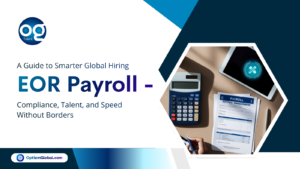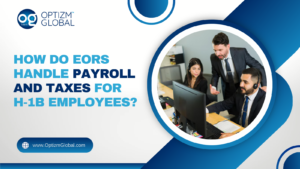Recruiting across international borders isn’t a ‘nice-to-have’ anymore; it is a competitive necessity! Companies ranging from startups, building a global remote team, to enterprises expanding business into new markets, are seeking the services of an Employer of Record (EOR) payroll provider that will facilitate international hiring and legal compliance for an international workforce.
However, picking the wrong EOR payroll provider can turn your exciting growth opportunity into a nightmare. The impact of selecting the wrong partner has real business stakes – employee happiness, tax compliance, legal compliance, and business continuity can all hang in the balance depending on who your partner is.
Before you sign a contract, let’s take a look at the most common mistakes companies make when choosing an EOR payroll provider—and how to avoid them.
1. Deciding Based on Cost Only
Understandably, cost is an important consideration; however, deciding on an EOR vendor strictly based on cost is a gamble. Low-cost providers often fail to meet their service obligations as they miss deadlines, are not compliant with local labor laws, and do not meet acceptable service and support standards.
What should you do instead:
Think value, not cost. An EOR vendor that costs a bit more but offers outstanding local knowledge; a robust tech stack, and comprehensive compliance support is worth it. Remember, if you’re paying less on payroll now, you could pay a lot more penalties or attrition later.
2. Disregarding Local Compliance Abilities
One of the most compelling reasons to outsource an EOR is to remain compliant with foreign employment laws. However, not all EOR providers are created equal in all markets.
Error: Assuming all providers have the same level of knowledge for addressing local tax codes, employment agreements, termination statutes, and benefit obligations.
What to do differently:
Check how experienced the EOR is in the countries where you are hiring. Ask for case studies, client references, or a demonstration of their compliance process for your market.
3. Forgetting to Evaluate Security and Privacy Safeguards
EOR payroll is handling very sensitive employee data—bank information, ID numbers, pay information, etc. If your partner has weak data protection practices, you are exposed to data breaches and litigation.
What to do differently:
Confirm that the EOR provider is GDPR-compliant (especially in EU countries), that they have encrypted data transfer methods, and that there is transparency about how they are storing the data. Ask about disaster recovery and security audits.
4. Not Evaluating Platform Usability and Integration
Some of the EOR partners have outdated or cumbersome platforms that are difficult to use for HR teams and employees. When you’re working with a complicated system, or if it does not work with your current systems (e.g. HRIS, accounting systems), you could become delayed.
What to do instead:
Get a live demo. Ensure it is user-friendly, mobile-optimized, and supports effortless payroll processing, time tracking, tax reporting, and employee self-service. Extra credit for having integrations with applications you are already using.
5. Underestimating the Value of Customer Support
Remote hiring already involves time zone and communication issues. When your EOR partner is not responsive or does not have dedicated support, issues get stuck for days, resulting in delayed payments, upset employees, or even worse.
Instead, do:
Select an EOR provider that has 24/7 or regionally based customer support. Ideally, you need to have a dedicated account manager who knows your business and your regions of operation.
6. Failing to Review the Entire Scope of Services
Certain companies presume that all EOR payroll vendors do it all—onboarding and contracts, benefits, and terminations. Others may provide only some partial support, and you’ll end up having to cover the gaps.
What to do instead: Get clarity on what’s included:
- Do they do end-to-end payroll?
- Will they take care of onboarding and offboarding?
- Are local benefits, taxes, and contributions part of the package? Can they offer work permits or visa help? Get all service offerings in writing before you proceed.
7.Neglecting Cultural and Language Barriers
Having cultural misalignment or language barriers with your teams and the EOR provider can lead to miscommunication, mistakes, and employee dissatisfaction.
What to do instead: Choose an EOR with local teams that understand the local language, customs, and expectations in each country where you’re hiring people. Clear culturally conscious communication will help build relationships and trust.
8. Not Future Proofing the Relationship
There might only be one or two countries you are focusing on hiring in today, but what is in store for the future? If your EOR cannot help you grow into new markets, you could have to switch providers during your expansion.
What to do instead: Choose a best-in-class, global, scalable EOR payroll partner, and ensure it is capable of growing with you as your hiring needs change.
Final Thoughts
Choosing the right EOR payroll partner for your company is about much more than outsourcing paperwork—it’s about choosing a genuine long-term strategic partner to help drive your global expansion, ensure you are compliant with local laws, and help streamline the employment experience for your foreign workers.
Avoid these issues and make sure your company will be a long-lasting organization with a future workforce thriving in cross-border contexts.
Be thoughtful in your selection of providers, ask the right questions, and value compliance and trust over cost and savings in the short term. When it comes to EOR payroll, you can set the foundations correctly, so your international hiring strategy is in a good place for the long run.






